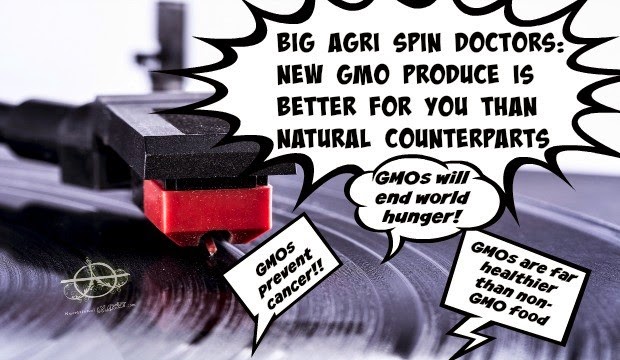Big Agri Spin Doctors: New GMO Produce Is Better For You Than Natural Counterparts
by Daisy Luther
Big Biotech/Agri companies like Monsanto and Del Monte are becoming increasingly desperate to sell us on their tainted goods.
Now, not only are they averring that genetically modified crops are not harmful, but that they are actually BETTER for you than non-modified foods.
Widget not in any sidebars
A new pineapple is being rolled out by Del Monte. It’s pink and apparently it will keep you from getting cancer.
…a new pink pineapple variety being developed in Costa Rica by Del Monte Fresh Produce, contains an over-expressed a gene from a pineapple and a tangerine. Some of its other genes have been silenced and its flowering process has been altered. All this genetic fiddling has produced a fruit with rose-colored flesh that is high in the cancer-fighting chemical lycopene. (source)
Monsanto is one of the companies hard at work to deceive you. They even have their own propaganda department, as reported by Heather Callaghan of Natural Blaze.
So really. You shouldn’t be silly about eating these good-for-you GMOs. Pamela Ronald, a plant scientist with the University of California, Davis, wants you to know you’ve already been eating them and you’re perfectly fine. (Like when Mom hides spinach in your spaghetti for your own good).
Humans have been genetically modifying their food for centuries through techniques like hybridization and selective breeding, Pamela Ronald, a plant scientist with the University of California, Davis, pointed out.
“Modern genetic alteration is different in that it splices genes from another species into another to produce some beneficial trait,” she said. (source)
Of course, she’s not actually making any promises.
“With any kind of breeding, there is a possibility of unintended consequences,” she said. “That is always a risk that scares people but it has to be put in perspective — the risk is no different than for other type of crop.” (source)
It’s okay. You probably won’t die right away. After all, already quietly lurking in stores is genetically modified corn, soybeans, cotton, canola, sugar beets, alfalfa, squash, and papaya. Soon, as we reported last week, apples and potatoes will be added to that list. The apples won’t brown when sliced because according to one company spokesperson, “We know that in a convenience-driven world, a whole apple is too big of a commitment.”
Congress has two paternalistic special interest bills on the table currently to decide whether or not we get to know if our food is modified.
I’ve said for quite some time, I think that GMO labeling is unlikely.
Crony capitalism in America isn’t going to allow changes that would require the labeling of genetically modified ingredients in your food. While in a perfect world, a place that requires people selling healthfully grown organic foods to jump backwards through hoops and turn a cartwheel to be allowed to place a “certified organic label” on their items, Big Agri can blithely don hazmat suits to spray ever-increasing amounts of glyphosate on crops that have been genetically modified to withstand the poisons, with nary a word to consumers.
 The reality is, Monsanto and their ilk have incredibly deep pockets. The Big Food companies that purchase vast amounts of GMO crops are also rolling in money. If you want to avoid GMOs, you can’t look to those who have a vested interest in selling them to protect you. You have to constantly educate yourself to beat them at their own game.
The reality is, Monsanto and their ilk have incredibly deep pockets. The Big Food companies that purchase vast amounts of GMO crops are also rolling in money. If you want to avoid GMOs, you can’t look to those who have a vested interest in selling them to protect you. You have to constantly educate yourself to beat them at their own game.Here are the top 10 strategies to remember when shopping for non-GMO foods, regardless of labeling and industry spin.
Don’t buy into the malarkey that it’s impossible to avoid GMOs these days. It’s entirely possible when you stop playing by the rules laid out by Big Food!
-
Stop looking for labels. Assume that if it isn’t labeled GMO-free, that it contains GMOs.
-
Look for products that are USDA Certified Organic or Non-GMO Project Verified.
-
Avoid all corn, soy, and canola that is not specifically labeled as non-GMO.
-
Familiarize yourself with the abundant aliases for corn and soy.
-
Buy ingredients, instead of food with ingredients.
-
Cook from scratch.
-
Stop shopping at the grocery store. Use local farms and online vendors.
-
Get to know your farmers personally.
-
Preserve food
while it’s in season.
-
Don’t be wasteful. Use every single edible part to make your food dollars go further.
Resources:
- GMO OMG
- GMO Free Diet: How to stay healthy by identifying and avoiding dangerous foods
- The Organic Canner
- Genetic Roulette: The Gamble of Our Lives
- GMO Food Poison Handbook: ‘Genetically-Modified’ Agriculture and Animals




